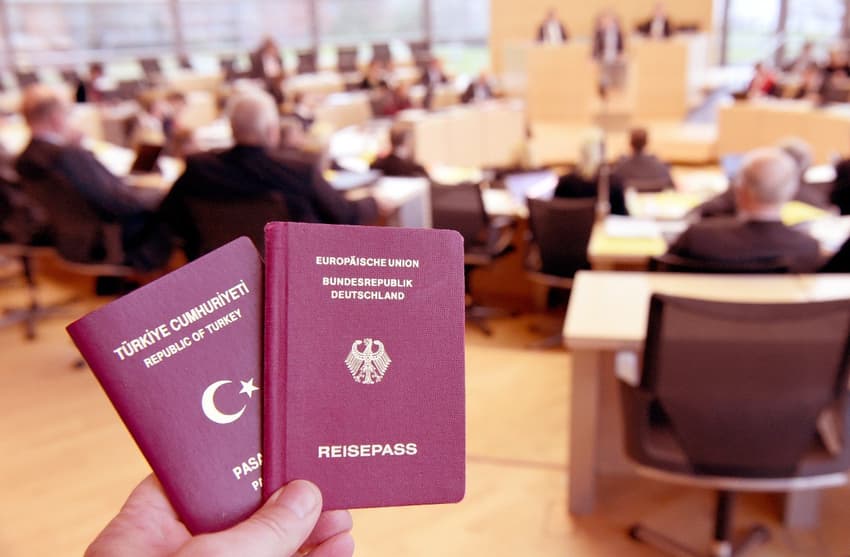TIMELINE: When will Germany push through the new dual citizenship law?

After its debate in the Bundestag on November 30th, Germany's overhaul of citizenship and dual nationality laws is facing yet another delay. Here are the next steps for the reform bill - and when the new rules could come into force.
People who meet the criteria for German citizenship are facing a tricky dilemma at present. Though long delays and bureaucracy make it tempting to get the ball rolling as soon as possible, many are also keen to wait until Germany's new liberalised laws come into place, allowing (among other things) the holding of multiple nationalities.
For those who don't quite meet the criteria yet, there are also plenty of reasons to count the days until the new law comes into force.
For one, the residence requirements will be drastically cut from eight years to five, meaning a far wider pool of internationals will be eligible for a German passport.
READ ALSO: UPDATED: The key points of Germany's draft law on dual citizenship
Nevertheless, it feels as if foreigners have been waiting endlessly for this hotly anticipated reform. And indeed, almost two years have passed since the plans were first announced in the coalition agreement of the Social Democrats (SPD), Greens and Free Democrats (FDP).
There has been some progress in the past few months, however.
After being passed by cabinet in summer, the bill went to its first reading in the Bundestag on November 30th, where it was subject to a heated debate between MPs.
So what are the next steps the government needs to clear in order to make the reforms a reality? And where are we in the process right now?
These are the key benchmarks to look out for in the coming weeks and months.
Read more about applying for dual citizenship in our German citizenship guide.
The Bundestag vote
The citizenship reform bill was originally meant to go to the Bundestag on November 9th, but internal debates about anti-Semitism saw it quietly removed from the parliamentary agenda.
A new, tightened bill returned the house for its first reading on November 30th, and will now face two more readings in the house before it is put to a vote.
According to recent media reports, however, the bill has been pushed back yet again thanks to disagreements between the three coalition partners.

A view of the German Reichstag, the seat of the Bundestag, on German Unity Day 2022. Photo:
picture alliance/dpa | Monika Skolimowska
The Greens and SPD apparently want to add exceptions to a clause excluding benefits claimants from citizenship, but the FDP is pushing back against these changes.
This means that the bill can no longer be passed this year and is likely to get its first reading sometime in late January or early February.
Once this stage is complete, all that remains is for the final bill to be signed into law by President Frank Walter Steinmeier (SPD).
READ ALSO: Germany's dual citizenship reform faces yet more delays
Does the bill have to pass through the Bundesrat?
Not in any meaningful way. The bill came to the Bundesrat in October this year and state leaders put a number of suggested amendments to the government, which they do not have to accept.
Since the citizenship law doesn't impact state law, finances or the German constitution in a significant way, SPD MP Hakan Demir has previously said the bill would not have to be approved by the Bundesrat, meaning it will be impossible for the conservative-led states to block the legislation.
The Bundesrat is entitled to disagree with the bill, he said, but the Bundestag could easily overrule this again.
The implementation phase
This is where things get a little bit less predictable: after signing the bill into law, the government will need to give local authorities a certain period of time to implement the changes.
If the government's Skilled Worker Immigration Law is anything to go by, this implementation phase would take around three months - or six in exceptional circumstances.

The exterior of the German Bundesrat. Photo: picture alliance/dpa | Wolfgang Kumm
However, if ministers are particularly keen for this to enter into force as soon as possible, they could also try and expedite this and get things done in less time.
New law enters into force: April 2024?
According to government sources, the Interior Ministry is hoping the law will be in place in April of next year.
"It is planned that the citizenship reform will come into force in April 2024 - and that this will also enable multiple citizenships and accelerated naturalisation," he explained.
This will be the moment that foreigners in Germany are waiting for. It will mean that they can officially apply for citizenship after just five years of residence - or three in exceptional circumstances - and that they can keep non-EU nationalities after nationalising as a German.
People aged 67 and over will also be able to forego language tests, while the children of migrants will automatically gain German citizenship provided their parents have been in the country for at least five years.
INTERVIEW: What is the biggest problem foreigners face when applying for German citizenship?
Should people submit their applications now?
This remains a tricky question for many, and depends quite a lot on where the application is submitted.
Anecdotally, there are some districts that manage to complete citizenship applications in just a couple of months - although these are definitely the exception rather than the rule.
Elsewhere, and particularly in the big cities like Berlin and Frankfurt, 18 months to three years tends to be the norm. That means that provided all goes to plan, most citizenship applications submitted now wouldn't be completed until after the new law comes into force.
In response to an enquiry from The Local, Berlin Mitte Citizenship Office clarified that, in these cases, people who applied before the law changes would still be able to keep their old citizenship after their application was processed.
"The law that is applicable at the time when German citizenship is granted is the law that is applied," they explained.
However, the only way to guarantee this happening is to submit your application only after the new regulations enter in force - since it's unlikely, but still possible, that your application may be processed in record time.
READ ALSO: Should you apply for German citizenship before or after the new law comes in?
Comments
See Also
People who meet the criteria for German citizenship are facing a tricky dilemma at present. Though long delays and bureaucracy make it tempting to get the ball rolling as soon as possible, many are also keen to wait until Germany's new liberalised laws come into place, allowing (among other things) the holding of multiple nationalities.
For those who don't quite meet the criteria yet, there are also plenty of reasons to count the days until the new law comes into force.
For one, the residence requirements will be drastically cut from eight years to five, meaning a far wider pool of internationals will be eligible for a German passport.
READ ALSO: UPDATED: The key points of Germany's draft law on dual citizenship
Nevertheless, it feels as if foreigners have been waiting endlessly for this hotly anticipated reform. And indeed, almost two years have passed since the plans were first announced in the coalition agreement of the Social Democrats (SPD), Greens and Free Democrats (FDP).
There has been some progress in the past few months, however.
After being passed by cabinet in summer, the bill went to its first reading in the Bundestag on November 30th, where it was subject to a heated debate between MPs.
So what are the next steps the government needs to clear in order to make the reforms a reality? And where are we in the process right now?
These are the key benchmarks to look out for in the coming weeks and months.
Read more about applying for dual citizenship in our German citizenship guide.
The Bundestag vote
The citizenship reform bill was originally meant to go to the Bundestag on November 9th, but internal debates about anti-Semitism saw it quietly removed from the parliamentary agenda.
A new, tightened bill returned the house for its first reading on November 30th, and will now face two more readings in the house before it is put to a vote.
According to recent media reports, however, the bill has been pushed back yet again thanks to disagreements between the three coalition partners.

picture alliance/dpa | Monika Skolimowska
The Greens and SPD apparently want to add exceptions to a clause excluding benefits claimants from citizenship, but the FDP is pushing back against these changes.
This means that the bill can no longer be passed this year and is likely to get its first reading sometime in late January or early February.
Once this stage is complete, all that remains is for the final bill to be signed into law by President Frank Walter Steinmeier (SPD).
READ ALSO: Germany's dual citizenship reform faces yet more delays
Does the bill have to pass through the Bundesrat?
Not in any meaningful way. The bill came to the Bundesrat in October this year and state leaders put a number of suggested amendments to the government, which they do not have to accept.
Since the citizenship law doesn't impact state law, finances or the German constitution in a significant way, SPD MP Hakan Demir has previously said the bill would not have to be approved by the Bundesrat, meaning it will be impossible for the conservative-led states to block the legislation.
The Bundesrat is entitled to disagree with the bill, he said, but the Bundestag could easily overrule this again.
The implementation phase
This is where things get a little bit less predictable: after signing the bill into law, the government will need to give local authorities a certain period of time to implement the changes.
If the government's Skilled Worker Immigration Law is anything to go by, this implementation phase would take around three months - or six in exceptional circumstances.

However, if ministers are particularly keen for this to enter into force as soon as possible, they could also try and expedite this and get things done in less time.
New law enters into force: April 2024?
According to government sources, the Interior Ministry is hoping the law will be in place in April of next year.
"It is planned that the citizenship reform will come into force in April 2024 - and that this will also enable multiple citizenships and accelerated naturalisation," he explained.
This will be the moment that foreigners in Germany are waiting for. It will mean that they can officially apply for citizenship after just five years of residence - or three in exceptional circumstances - and that they can keep non-EU nationalities after nationalising as a German.
People aged 67 and over will also be able to forego language tests, while the children of migrants will automatically gain German citizenship provided their parents have been in the country for at least five years.
INTERVIEW: What is the biggest problem foreigners face when applying for German citizenship?
Should people submit their applications now?
This remains a tricky question for many, and depends quite a lot on where the application is submitted.
Anecdotally, there are some districts that manage to complete citizenship applications in just a couple of months - although these are definitely the exception rather than the rule.
Elsewhere, and particularly in the big cities like Berlin and Frankfurt, 18 months to three years tends to be the norm. That means that provided all goes to plan, most citizenship applications submitted now wouldn't be completed until after the new law comes into force.
In response to an enquiry from The Local, Berlin Mitte Citizenship Office clarified that, in these cases, people who applied before the law changes would still be able to keep their old citizenship after their application was processed.
"The law that is applicable at the time when German citizenship is granted is the law that is applied," they explained.
However, the only way to guarantee this happening is to submit your application only after the new regulations enter in force - since it's unlikely, but still possible, that your application may be processed in record time.
READ ALSO: Should you apply for German citizenship before or after the new law comes in?
Join the conversation in our comments section below. Share your own views and experience and if you have a question or suggestion for our journalists then email us at [email protected].
Please keep comments civil, constructive and on topic – and make sure to read our terms of use before getting involved.
Please log in here to leave a comment.